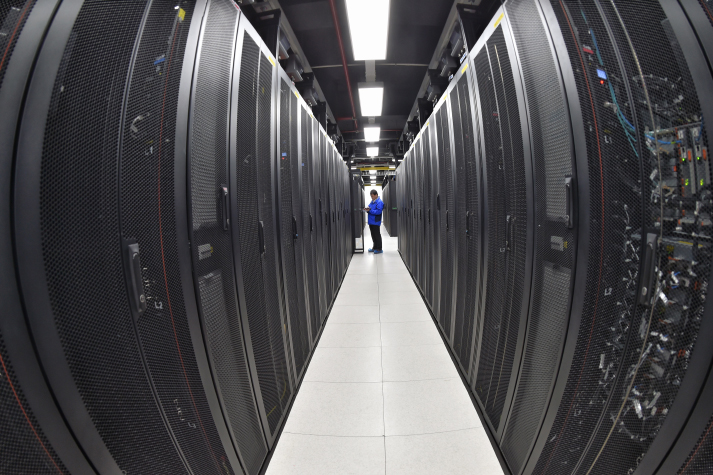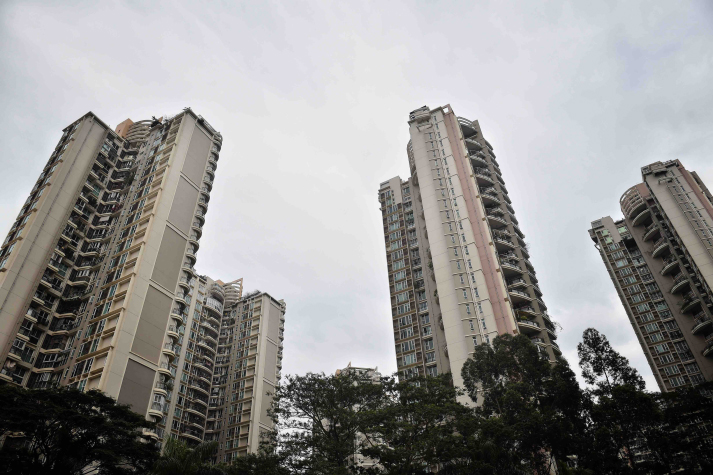| Opinion |
| Positive and Pragmatic | |
|
|
 Technicians work in a cloud computing center in Fuzhou, capital of southeast China's Fujian Province, on April 24 (XINHUA)
On July 31, the Political Bureau of the Communist Party of China (CPC) Central Committee convened a meeting to analyze the current economic situation and set the tone for economic work in the second half of 2018. The Digital Media Center of China International Publishing Group interviewed experts on the key areas covered by the meeting and their outcomes. Edited excerpts of the interviews follow: The meeting pointed out that despite stable growth, the Chinese economy is now facing new challenges and problems and that external circumstances have changed significantly. What are these new challenges and problems? And what are the changes?
The stock, foreign exchange and bond markets have seen drastic fluctuations, resulting in mounting potential risks. Fixed-asset investment increased 6 percent, marking a record low. The dramatic decline in infrastructure investment is primarily caused by measures such as the deleveraging of state-owned enterprises and the standardization of public-private partnership projects. Fiscal revenue, tax revenue in particular, has grown quickly, which has allowed authorities to adopt a more proactive monetary policy as well as improving its effectiveness in expanding investment and restructuring the economy. China should keep pace with the changes taking place in the world and give priority to stability by focusing on steady employment, finance, foreign trade and investment. Efforts should also be made to seek improvement and growth amid stability.
Secondly, the ongoing trade war waged by the United States against China is seemingly a response to the Sino-U.S. trade imbalance. But in essence, it is an overreaction to China's rapid rise in recent years. The United States sees China as its biggest opponent and is trying to contain its development, especially in areas of core technology, which poses a challenge to the future development of the latter. Thirdly, as unilateralism and protectionism increase worldwide, major economies in the West such as the United States, Japan and the European Union (EU) have intensified their attempts to remold world trade rules, demonstrated by the tariff agreement reached between the United States and the EU. According to some media reports, Japan and the United States are also planning to hold discussions over tariffs. In my view, these moves are targeted at reshaping world trade rules in accordance with the values held by the West. In the face of these external circumstances, China's economic development is very likely to encounter new problems and challenges. Policymakers at the meeting proposed that improving weak links should be considered a key task in deepening supply-side structural reform. Progress should also be made in strengthening the country's ability to innovate and foster new growth engines. What are these potential new growth engines? And what are the weak links that need to be improved?
development. In the first half of the year, while traditional industries were experiencing de-capacity and slowdown, new technologies in the biological and information industries as well as new types of business such as the sharing economy—powered by combining the application of the Internet, big data and cloud computing—have assumed the mantle of injecting new vigor into the national economy. On the flip side however, problems emerged in the course of fostering new growth engines, such as the heavy shock sustained by sanctions on ZTE, which indicates that China still lags behind the developed world in terms of core competitiveness and technological innovation and application in some sectors. In a broader sense, new growth impetus does not only exist in emerging industries, but in traditional sectors too. As long as an industry has the capacity to further raise added value and produce quality brands, we can say there is potential new growth impetus in this industry. China can reinvigorate emerging and traditional industries by improving the institutional environment and improving the environment for innovation. To this end, China needs to focus on its weak areas such as innovation and fundamental research.  A residential housing project in Shenzhen, south China's Guangdong Province (XINHUA)
It was suggested at the meeting that problems arising from the real estate market should be met with firm resolutions. Efforts should be accelerated to establish a long-term mechanism for the stable and healthy development of the real estate market. What is this long-term mechanism? How does it differ from the current regulatory mechanism? What new policies are in the cards? Xu Hongcai: Since the beginning of this year, housing prices have been relatively stable in first-tier cities, but prices in third- and fourth-tier cities have shown a slight upward trend. Therefore, a long-term mechanism needs to be established to treat both symptoms and root causes in the property market. Firstly, to address the root causes, the related systems and mechanisms need to be improved, such as encouraging both renting and purchasing, and establishing a multi-channel supply mechanism. If measures are taken to optimize supply at the source, the surge of property prices can be effectively curbed. In fact, related policies to this end have been in effect since last year. Secondly, urban and industrial development planning should be scientific and rational. Attention should be paid to the integration of city and industries as well as the coordinated development of the two. Consideration should be given to local comparative advantages, and replicative construction should be avoided. Thirdly, progress needs to be made in market-oriented land reform to facilitate the orderly flow of land as a production factor. Immobility leads to the short supply of land, which is a major cause of skyrocketing house prices. Fourthly, the social security system must be further improved and equal access should be guaranteed to basic public services. The governments of third- and fourth-tier cities should increase investment in public facilities concerning healthcare, education and culture, and narrow the gap between cities in an effort to address the causes motivating people to flood into the country's major urban centers. The reform of the household registration system should also be accelerated to this end. Lastly, fiscal and financial policies should be geared to ensure the stable development of the real estate market. Bank credit policies should be differentiated to harness speculation and guarantee rigid demand is met. It was demanded at the meeting that the legal rights and interests of foreign-funded enterprises in China be protected. In the context of the Sino-U.S. trade war, what message does that convey? Yuan Youwei: An official voice from the Chinese Government on this matter is significant. To my knowledge, in the United States there is a lot of misunderstanding about China's attitude towards foreign enterprises in the country, particularly around the protection of intellectual property rights and technology transfer. In parts of the media and some think tanks, there is the assumption that foreign enterprises in China may see their rights and interests undermined because the United States initiated a trade war. Against this backdrop, a voice from China's top leadership can help clear the air and bolster foreign businesses' confidence in the Chinese market. The response is also in line with recent measures implemented by China to open wider to the outside world. It is worth mentioning that many U.S. entrepreneurs in China are hoping that the trade war will end as soon as possible, because they believe it is difficult to find another place where the business environment is as good as it is in China. After four decades of reform and opening up, China has developed complete supply and industrial chains. It is hard to find such a large market and ideal production base elsewhere. The message from the Chinese Government will not only dispel misunderstandings and one-sided interpretations about China, but also make clear the country's determination to further open up. CPC Meeting Stresses Economic Stability in H2 China will keep its economy on a stable and healthy development track with a proactive fiscal policy and prudent monetary policy in the second half of 2018, according to a meeting of the Political Bureau of the CPC Central Committee on July 31. The meeting stressed that China will maintain the basic tone of "seeking progress while maintaining stability" for its economic work and allow the economy to continue to perform within a reasonable range. Efforts should be made to push supply-side structural reform and win the "three tough battles," according to a statement released after the meeting. China's economy has maintained steady growth with good momentum in the first half year, according to the statement. However, the economy still faces some new challenges and the external environment has changed notably. China should focus on the "principal contradiction" and take targeted measures to solve it, the statement said. The country will continue to implement a proactive fiscal policy and prudent monetary policy while making policies more forward-looking, flexible, and effective. Fiscal policy should play a bigger role in expanding domestic demand and structural adjustments. China will maintain control over the floodgates of monetary supply and keep liquidity at a reasonable and ample level. Efforts should be made to keep employment, the financial sector, foreign trade, foreign and domestic investments, and expectations stable. The legitimate rights of foreign-funded companies in China will be protected, according to the statement. The country should make strengthening areas of weakness an important task in deepening supply-side structural reform, with intensified efforts to be made in improving infrastructure. Work should also be done to improve innovation capability, develop new engines of growth, eliminate institutional barriers for cutting excessive capacity, and lower costs for companies. "China must better combine the task of forestalling and defusing financial risks with serving the real economy," the statement said. To that end, the country should stand firm on reducing the leverage ratio, ensure the proper policy intensity and tempo, and coordinate the timing of unveiling new policies. "Through innovation of mechanisms, China must raise the capacity and willingness of financial institutions to serve the real economy," the statement said. The meeting called for pressing ahead with reform and opening up and continuing to roll out major effective reform measures. Crucial policies of expanding opening up and significantly relaxing market access should be implemented, and the joint construction of the Belt and Road should be advanced in depth. Efforts should be made to make China's first import expo, the China International Import Expo, successful. The meeting stressed that the problems in the property market must be resolved properly. A differentiated approach to property market regulation in different cities should be upheld firmly to promote balanced supply and demand. The expectation should be properly guided and the market order should be regulated to firmly curb the rise in home prices. The establishment of a long-term mechanism to promote the stable and healthy development of the property market should be accelerated. (Source: Xinhua News Agency) Copyedited by Laurence Coulton Comments to zhouxiaoyan@bjreview.com |
|
||||||||||||||||||||||||||||||
|